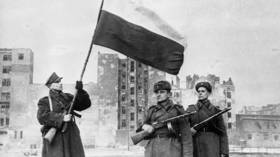Shambles: Latvia bans RT, saying it’s ‘controlled’ by EU-sanctioned journalist… who heads DIFFERENT outlet with similar name

Latvia’s media council has announced a complete ban on seven RT channels, declaring falsely that they are “under the effective control” of a person subject to sanctions imposed by the European Union.
The person in question is well-known Russian broadcaster Dmitry Kiselyov, who in fact heads a completely different news organization called Rossiya Segodnya — a basic fact-check that the bright sparks at Latvia’s National Electronic Media Council (NEPLP) seemingly failed to conduct.
Kiselyov has indeed been under EU sanctions since Crimea voted for reunification with Russia in 2014, but he has nothing to do with RT or its broadcasting.
Of course, the knee-jerk move to banish RT based on false information could have been avoided had the council taken even a cursory glance at either RT or Rossiya Segodnya’s Wikipedia pages.
Entirely unaware that it had banned the wrong news organization, the NEPLP wrote in a dramatic statement that the “evidence” it had obtained against RT and Kiselyov is “very strong.”
Also on rt.com ‘European values’? Czech think tank funded by NATO govts calls for EU BLANKET BAN on Russian outlets like RTRT’s main channel, as well as its Arabic, Spanish and Documentary channels, fall under the new ban.
The NEPLP also announced its intention to “inform media regulators in other EU countries” of the decision it has taken and considers that a “similar ban” on distribution of RT would be “acceptable” across the EU.
It is probably safe to assume for now, however, that a blanket ban on RT across the EU is not imminent.
Responding to the move, RT’s Press Service offered congratulations to the NEPLP, given that it will now “finally will be able to protect the Arab- and Spanish-speaking” demographics in Latvia from the “most influential Russian propaganda channel” in the West.
RT’s (real) editor-in-chief, Margarita Simonyan (who is not under EU sanctions), also responded to Riga’s blunder, noting a trend of sensational and often outlandish claims made by Western intelligence agencies.
“Latvian intelligence believes that RT is headed by Dmitry Kiselyov. American intelligence believes that a program I hosted in 2011 [on] a local Russian channel influenced the US election. British intelligence believes that the Skripals were poisoned by Boshirov and Petrov. So that’s good news,” Simonyan said, adding that with such intelligence services, Russia has little to be worried about.
The International Federation of Journalists also reacted to the ban, with its general secretary, Anthony Bellanger, saying that it “violates freedom of the press, the right of citizens to media pluralism and is a clear act of censorship.” The press freedom organization demanded the lifting of the ban “immediately.”
The NEPLP said the Latvian ban will remain in force “until Kiselyov is removed” from the EU sanctions list — or, presumably, until the country’s regulator realizes its mistake... and finds another pretext.
Think your friends would be interested? Share this story!














